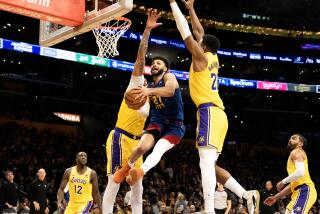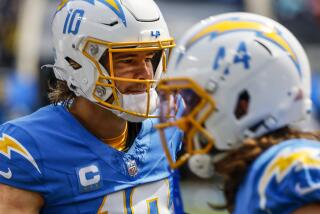Issel Is Forgivable, but O’Leary Is Contemptible
It’s probably fitting that a year that has been so hard on coaches comes to an end with two men heading into what might be a long exile: George O’Leary and Dan Issel. Sudden and unpredictable disgrace is perhaps the only thing beyond profession the two men have in common.
The holidays, particularly this year, ought to be a time for compassion and forgiveness. But I’m having an easier time embracing Issel than O’Leary.
On the face of it, O’Leary might have hurt only himself by lying about his athletic and academic background on his biography and thereby taking himself out of the head coach’s office at Notre Dame before he even got unpacked. O’Leary may have disappointed people who had trusted him enough to bring him to Notre Dame. But he didn’t drag other innocent folk into the abyss with him.
Issel, on the other hand, uttered a profane and racially charged remark at a fan that proved hurtful to many people of Latino descent and others who are just sick and tired of any comment that calls negative attention to race or ethnicity.
But what’s happened since has put the two men, at least in my mind, in a completely different light. Issel wanted out and the Denver Nuggets wanted him out mostly because he wasn’t a very good coach and appeared to have lost his players. Issel was playing to mostly critical reviews even before the incident with a drunken fan after a Dec. 11 loss to Charlotte and was subsequently suspended for four days by the Nuggets. And even though he might not have survived the season just on the issue of his ability to coach, his departure the day after Christmas will always be linked to the ugly utterance directed at the fan.
But the Denver Post carried a very worthwhile piece of information in Thursday’s editions. It quoted Ernest Gurule, a University of Colorado at Denver official and activist in the area’s Latino community, as saying this of Issel’s departure, which appears to have been part firing, part resignation: “I guess the Nuggets took into account all kinds of things, not the least of which is the team record over the last several years. I wish he would have stuck around long enough to demonstrate the sincerity of the words he shared with the committee” of Latino leaders in Denver.
In other words, the people most offended by Issel believed in the sincerity of his apology the day after the confrontation with the fan. “I have no doubt,” Gurule said, “that Dan Issel will be a man of his word and integrate himself with a community he’s not yet part of.”
What that sentiment, and others like it, suggests is that Issel’s 25 years in Denver, as a player, coach, broadcaster and executive, were served with some distinction. Issel isn’t John Rocker. Issel isn’t a bum. There’s no pattern of offensive behavior that we know of. My impression is he lost his cool, did something regrettable, and is genuinely sorry. He took quite seriously not only the reaction of the offensive mark, but his apology, and his stature as a high-profile adult in the Denver area. He was accountable for his actions, which is about all we can ask of anyone.
Can we say the same thing about O’Leary? I can’t. The longer I listened to his interview Sunday night with ESPN’s Mike Tirico on “SportsCenter,” the more I fumed. O’Leary didn’t take responsibility when he had the chance in a national forum. OK, he copped to saying on his bio that he lettered three times on the football team when, in fact, he never set foot on the field during a game.
But to the more serious offense, lying about his academic background, O’Leary bailed on his responsibility. He said, essentially, he wasn’t sure how the entry of having a master’s degree from New York University made it onto his resume. He wasn’t sure, he said, how it got there or why it remained there.
At that moment, having granted that interview, he had an obligation to Georgia Tech, Notre Dame, the students he has coached and the ones he hopes to coach, to look the interviewer in the eye and say, “I lied, I regret it, it’s inexcusable, and it is up to me to make good. The onus is on me to prove that while I lied, I am not a liar.”
But O’Leary couldn’t do that. He offered up more lame alibis. He wasn’t man enough to take accountability for his actions, which is far worse in my book than lying.
If Ralph Friedgen had wanted to hire his old boss at Georgia Tech as an assistant at Maryland, I was all for it ... before that interview. With O’Leary being way short on credibility at the moment, Friedgen would have to loan him some. And that’s OK if Friedgen wanted to take that on while O’Leary struggled to his feet. But O’Leary isn’t worthy of that second chance until he can look people in the eye, apologize for lying and ask for the second chance.
How do you impress upon students the notion of accountability if you, the coach, can’t assume any? Nobody holds anyone’s feet to the fire forever these days. Notoriety isn’t the life sentence it was 50 years ago. Anybody and everybody can be rehabilitated if the general public sees the slightest hint of sincerity. O’Leary just hasn’t shown much, not yet anyway.
Friday was Notre Dame’s 26th day without a head football coach. So far, The University of Football in America has had to part with a man it employed ever so briefly, O’Leary, and been spurned by Tom Coughlin, Jon Gruden, Steve Mariucci, Rick Neuheisel and Mike Shanahan. Perhaps it isn’t the job people once thought it to be.
Regardless, every day the Notre Dame vacancy is in the news, O’Leary must feel as if he’s being hit with a cattle prod. Maybe if it stays vacant long enough, and if he feels enough guilt over what he did to himself and to Notre Dame, he’ll find it somewhere within to do what Issel did, find acceptance on some level, and then get on with his life.
More to Read
Go beyond the scoreboard
Get the latest on L.A.'s teams in the daily Sports Report newsletter.
You may occasionally receive promotional content from the Los Angeles Times.










